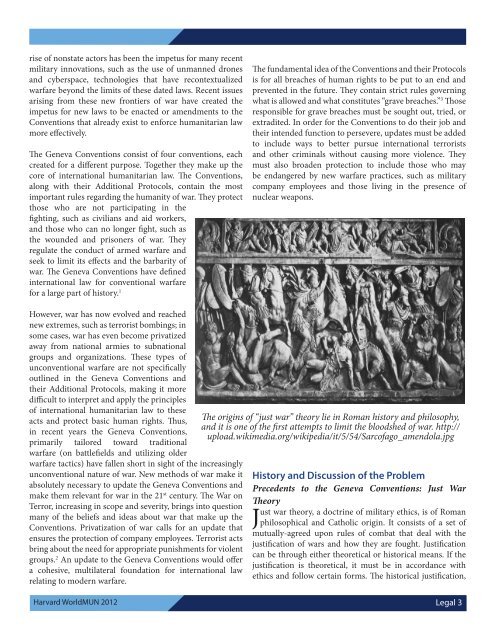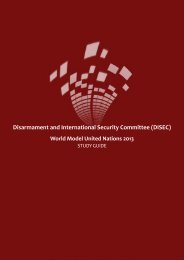Legal Committee - World Model United Nations
Legal Committee - World Model United Nations
Legal Committee - World Model United Nations
You also want an ePaper? Increase the reach of your titles
YUMPU automatically turns print PDFs into web optimized ePapers that Google loves.
ise of nonstate actors has been the impetus for many recent<br />
military innovations, such as the use of unmanned drones<br />
and cyberspace, technologies that have recontextualized<br />
warfare beyond the limits of these dated laws. Recent issues<br />
arising from these new frontiers of war have created the<br />
impetus for new laws to be enacted or amendments to the<br />
Conventions that already exist to enforce humanitarian law<br />
more effectively.<br />
The Geneva Conventions consist of four conventions, each<br />
created for a different purpose. Together they make up the<br />
core of international humanitarian law. The Conventions,<br />
along with their Additional Protocols, contain the most<br />
important rules regarding the humanity of war. They protect<br />
those who are not participating in the<br />
fighting, such as civilians and aid workers,<br />
and those who can no longer fight, such as<br />
the wounded and prisoners of war. They<br />
regulate the conduct of armed warfare and<br />
seek to limit its effects and the barbarity of<br />
war. The Geneva Conventions have defined<br />
international law for conventional warfare<br />
for a large part of history. 1<br />
However, war has now evolved and reached<br />
new extremes, such as terrorist bombings; in<br />
some cases, war has even become privatized<br />
away from national armies to subnational<br />
groups and organizations. These types of<br />
unconventional warfare are not specifically<br />
outlined in the Geneva Conventions and<br />
their Additional Protocols, making it more<br />
difficult to interpret and apply the principles<br />
of international humanitarian law to these<br />
acts and protect basic human rights. Thus,<br />
in recent years the Geneva Conventions,<br />
primarily tailored toward traditional<br />
warfare (on battlefields and utilizing older<br />
warfare tactics) have fallen short in sight of the increasingly<br />
unconventional nature of war. New methods of war make it<br />
absolutely necessary to update the Geneva Conventions and<br />
make them relevant for war in the 21 st century. The War on<br />
Terror, increasing in scope and severity, brings into question<br />
many of the beliefs and ideas about war that make up the<br />
Conventions. Privatization of war calls for an update that<br />
ensures the protection of company employees. Terrorist acts<br />
bring about the need for appropriate punishments for violent<br />
groups. 2 An update to the Geneva Conventions would offer<br />
a cohesive, multilateral foundation for international law<br />
relating to modern warfare.<br />
The fundamental idea of the Conventions and their Protocols<br />
is for all breaches of human rights to be put to an end and<br />
prevented in the future. They contain strict rules governing<br />
what is allowed and what constitutes “grave breaches.” 3 Those<br />
responsible for grave breaches must be sought out, tried, or<br />
extradited. In order for the Conventions to do their job and<br />
their intended function to persevere, updates must be added<br />
to include ways to better pursue international terrorists<br />
and other criminals without causing more violence. They<br />
must also broaden protection to include those who may<br />
be endangered by new warfare practices, such as military<br />
company employees and those living in the presence of<br />
nuclear weapons.<br />
The origins of “just war” theory lie in Roman history and philosophy,<br />
and it is one of the first attempts to limit the bloodshed of war. http://<br />
upload.wikimedia.org/wikipedia/it/5/54/Sarcofago_amendola.jpg<br />
History and Discussion of the Problem<br />
Precedents to the Geneva Conventions: Just War<br />
Theory<br />
Just war theory, a doctrine of military ethics, is of Roman<br />
philosophical and Catholic origin. It consists of a set of<br />
mutually-agreed upon rules of combat that deal with the<br />
justification of wars and how they are fought. Justification<br />
can be through either theoretical or historical means. If the<br />
justification is theoretical, it must be in accordance with<br />
ethics and follow certain forms. The historical justification,<br />
Harvard <strong>World</strong>MUN 2012 <strong>Legal</strong> 33

















